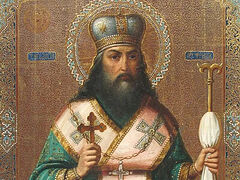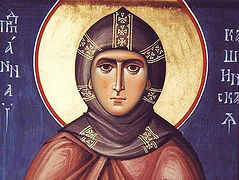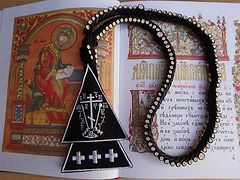Patriarch Nikon went down in history as the Russian Patriarch who instigated the Old Believer schism by reforming—in fact, correcting—the Church service books. The author here gives a more dispassionate historical and spiritual assessment of his longsuffering life.
***
August 4 marked the 369th anniversary of the enthronement, and August 30, the 340th anniversary of the repose of Patriarch Nikon (1605–1681). Uneven dates for a controversial personality. Different historians give him conflicting characteristics.
But isn’t it strange to unambiguously characterize a person who changed considerably over his lifetime and unambiguously evaluate his activity which changed even more dramatically?
However, for secular historians who set as their task a specific assessment of the eras and personalities that influenced these epochs, such a formulation of the question is understandable. However, there is an opinion that Church history should be written in a slightly different way—as a study of the history of holiness. And holiness is such a complex concept!
Initially, the word “saint” meant someone dedicated to God, and only over time did it begin to mean someone who was worthy of his dedication. We are all consecrated to God in Holy Baptism, but the question of holiness is about how one implements this consecration.
Implementation in this case is not an act, but a process. And anything can happen during it.
If thou take forth the precious from the vile, thou shalt be as My mouth (Jer. 15:19), the Scripture tells us. Because the Lord seeks all that is good that serves to justify a person. We cannot separate chalk from cheese if they are already mixed. But the Lord can—He is constantly engaged in the supernatural purification of our cheese. Although, He chalks us somewhere—for medicinal purposes.
In this regard the story of Patriarch Nikon is very illustrative.
It is a story of a man who was gifted, brilliant, zealous, pious and destined for high service for the glory of God, but was ordained to it prematurely.
***
He had a sad childhood as an orphan with a cruel stepmother who in no way could teach him gentleness and love. In his youth he was diligent in piety and studies—from the age of twelve he lived in a monastery of his own free will. He had a father, either despotic or weak-willed, who at first didn’t defend him from his stepmother and then lured the young man home from the monastery where his relatives insisted on his marriage.
 An engraving of Solovki, the seventeenth century
An engraving of Solovki, the seventeenth century
That was followed by the funerals of his three children who died one after another, and the decision to return to the monastic path: Nikita (his secular name) persuaded his wife to take the veil. He assigned her to one of the capital’s convents and himself took the monastic vows on Solovki where it was hard, cold and deserted.
And it was there that he made the main mistake of his life—there, and not on the Patriarchal Throne.
The special Providence of God was revealed in the fact that the huge, powerful man was in obedience to Elder Eleazar of Anzer—one of the most notable ascetics of his time and a mentor who was able to polish his richly gifted nature.
But Nikon quarreled with the elder and moved to another monastery.
He quarreled under a plausible pretext: He set out vigorously constructing a stone church at the skete, but the elder didn’t approve of it. Nothing new—everything was as always in such cases, “I want to do what’s best, but the elders stand in my way.”
Some write that this story revealed Nikon’s imbalance, which was far from monastic passionlessness. But, firstly, the concept of imbalance lies in the sphere of mental rather than spiritual problems. And secondly, is passionlessness really the most important thing in monastic life? Even so, very few people attained it during their lifetime, to say nothing of novices.
Monastic life is not about dispassion—it is about the methods of seeking God’s will and attaining piety. Obedience is one of the methods of monastic piety, when a person through obedience to those older than him tries to find God’s will.
The lesson which wasn’t learned by the novice monk boiled down to understanding that all the external vigorous activity, even the most plausible, may be unnecessary or displeasing to God because it is harmful to the person in question. It is often simply premature, while many types of activity must be ripe.
Good spiritual elders grow out of good novices; good leaders grow out of good subordinates. Whoever becomes an elder too early often spoils the business and harms the younger ones.
But Nikon didn’t understand this. He was in a hurry to take up the service of the Church—in such a hurry that he refused obedience to the best and most experienced spiritual father of his time.
Why? We don’t know.
It was unlikely due to an exceptional vanity and lust for power. Nikon was a man of colossal strength—both physical and intellectual. He was bursting with zeal, driven by concern for the glory of God! Such things are called zeal beyond reason. Both chalk and cheese are mixed in it...
***
In a nutshell, Nikon moved to another monastery, became its abbot, soon ended up at the royal court, was spotted by Tsar Alexei Mikhailovich (1629–1676), quickly showed his great abilities and became one of the most prominent bishops. He first served as Metropolitan of Novgorod, and then became a Patriarch (1652–1666) and as such showed a domineering and tough disposition.
He was not only spotted by the Tsar, but became his “close friend.” The need to rule a huge country fell to Alexei Mikhailovich at the age of sixteen—he was young and scared, and badly needed a strong shoulder to lean on. Nikon with his statesmanship, power, determination and outstanding performance became a father figure for him.
And the Tsar entrusted the Patriarch with the title of the Great Sovereign, which had once been borne by Patriarch Philaret by right of the Tsar’s (Mikhail Feodorovich’s) parent.
Nikon inspired the Tsar to take over Little Russia [Malorossia—most of what is now Ukraine.—Trans.] and wage victorious wars. He successfully ruled the country while Alexei Mikhailovich left for long military campaigns, judging, laying down the law, accepting petitions and corresponding with foreign courts...
And he brought the boyars under control. The boyars believed that he “made their life miserable.” He ordered: “You must not be late for meetings—any later and you will stand outside in the cold as long as you please”; “You must not sit in the presence of the Great Sovereign”; “You must keep the fast if you are sent with the Metropolitan for the relics of St. Philip and attend services during the journey.”
In some sense, the boyars would have been right to complain about the Patriarch’s sternness—after all, not everyone had an iron constitution—but for the main point in their complaints. The main point was not Nikon’s severity, but the humiliating need to endure severity from a “peasant’s son”. “There has never been such a dishonor before—the Tsar has submitted us to metropolitans.” This was the main complaint—dishonor!
Such frank, undisguised arrogance was the disease of the age. And, like any serious malady, it could kill. Let us recall that the Time of Troubles largely began with arrogance of the boyars who didn’t want to recognize a less noble claimant as their Tsar. So Nikon clipped their wings, following his idea of the good of the State.
The severity of those times was not embarrassing—our greatest saints of those centuries imposed the most severe penances for “mere trifles”, according to our standards.
True, there were cases of excessive harshness on the part of Nikon. For example, he deposed and exiled Bishop Pavel of Kolomna who had objected to the decree to reduce the number of prostrations in the Lenten services. Though I think when Nikon later found himself in the place of the deposed bishop, he remembered him.
***
But why shouldn’t we agree with the statement that Nikon’s behavior could be solely explained by his “lust for power and ambition”? He introduced, for example, a breathtakingly luxurious court.
So what of it? This was the understanding of the representative function of the Great Sovereign in those days. Metropolitan Jonah introduced a luxurious court after becoming the first Primate of the autocephalous Russian Church as well. And he is a saint. In personal life, both were ascetics.
Nikon was an ascetic even to the point of holy foolishness. With his two-meter (6 ft. and 6.7 in.) height, he didn’t wear a chain, but he wore the most luxurious vestments weighing about 100 kilos during long, many-hour Patriarchal services and processions.
There are other testimonies about his character. For example, there was a riot in Novgorod when Nikon was a metropolitan there. He tried to pacify the rioters, but was beaten to within half an inch of his life and left to die. Thanks to his robust health and fortitude, he rose the next day, went to church, celebrated the Liturgy and began to ask for people’s forgiveness, thus bringing them to repentance. When the troops sent to put down the riot approached, Nikon petitioned to pardon the rebels.
He who has never been beaten by an enraged mob can’t imagine what a humiliation it is and how hard it is to do what the Metropolitan of Novgorod did.
***
The reforms carried out under Nikon cannot be characterized as flagrantly provocative. At the end of the fourteenth century in Russia there had been a complete change of the Typicon, and no one had attached superfluous importance to it. The services had changed beyond recognition, and there had been no troubles. Now minor details of the Typicon were changed—and what a clamor arose!
The end of the fourteenth century was the age of St. Sergius of Radonezh and the flourishing of holiness in Russia, and, as a result, there was an ability to distinguish the primary from the secondary. But the mid-seventeenth century marked the decline of piety, and, consequently, petty ritualism.
Now we realize this, but then it was hard to predict such a reaction. So why put the blame for this on Patriarch Nikon?
In addition, the “correction of books” was carried out. But was that bad? The handwritten liturgical books were full of errors, and then the errors migrated to printed editions—what good was that?
The idea had appeared under the previous Patriarch, and Nikon only implemented it. The idea was correct—to unify the liturgical books according to old handwritten lists. Another matter is that we didn’t have an academic base at all. No historiography, no source study. The Patriarch acted by feel. There was no experience of critical work with texts—nothing that could be obtained from a good academic tradition.
But was it one man’s fault?
***
 Tsar Alexei Mikhailovich Nikon was deposed by a series of intrigues. Over years the boyars and a significant number of clergy who were angry with him turned the Tsar against the Patriarch. The Tsar had ceased to be a frightened youth; he had grown up, won many battles, and felt like a significant figure. The “close friend” who was working so hard—not only for the Church, but also for the Fatherland—began to upset him with his imperiousness and irritate him with his shortcomings.
Tsar Alexei Mikhailovich Nikon was deposed by a series of intrigues. Over years the boyars and a significant number of clergy who were angry with him turned the Tsar against the Patriarch. The Tsar had ceased to be a frightened youth; he had grown up, won many battles, and felt like a significant figure. The “close friend” who was working so hard—not only for the Church, but also for the Fatherland—began to upset him with his imperiousness and irritate him with his shortcomings.
And the “quietest” Tsar hurled an extremely unjust accusation against Nikon. The latter was naturally offended. In his resentment he made mistakes.
For the next eight years things developed according to this scenario: Nikon, who hadn’t been accustomed to fair accusations, couldn’t cope with unfair ones. No sooner had he come to terms with the loss of one position than he was ousted from the other two. Slander was cast on him no less than on St. Maximus the Greek.
Finally, in 1666, he was deposed, defrocked and incarcerated in St. Ferapont Monastery where he was put under guard in a cell that was “stinking and smoky beyond description” with bars on the windows.
Alexei Mikhailovich had pangs of conscience and tried to mitigate Nikon’s conditions. But once he was transferred to normal cells and allowed to communicate with people, his haters from among the boyars and bishops slandered him with renewed vigor. There were rumors that Nikon was planning to flee to the Don to Stenka Razin.[1] So the prisoner was again locked up as in a jail.
“Now I am sick, naked and barefoot,” he wrote. “Living in want in my cell, I am scorbutic; my arms hurt, and the left one cannot be raised; there are infections in my eyes from smoke; my gums are bleeding pus and very sensitive to hot, cold and sour. My legs are swollen. The guards forbid me to sell or buy anything. No one comes to me, and there is no one to ask for alms.”
Alexei Mikhailovich again mitigated the conditions in prison, but enemies again made them tougher.
 Patriarch Joachim At one point Nikon wrote plaintive petitions to Moscow, and at another point uttered harsh complaints, which his enemies carefully documented. One of them was the new Patriarch Joachim (1674–1690)—a boyar, and, more importantly, a man to whom Nikon had once shown favor.
Patriarch Joachim At one point Nikon wrote plaintive petitions to Moscow, and at another point uttered harsh complaints, which his enemies carefully documented. One of them was the new Patriarch Joachim (1674–1690)—a boyar, and, more importantly, a man to whom Nikon had once shown favor.
In early 1676, Alexei Mikhailovich died, and in May of that year Patriarch Joachim collected many absurd accusations against Nikon and sent him even further north with the instructions: “Confiscate diligently all alms given to him, for his reform and repentance.”
Again a stinking cell, smoke, scurvy, a ban on walks and any contacts. After another four years of such a life his physical reserves were exhausted—Nikon took to his bed.
In all the previous years, the young Tsar Fyodor Alexeyevich (1676–1682) had in vain tried to overcome Patriarch Joachim’s resistance and make the prisoner’s life easier. Then he ordered Nikon to be returned to his New Jerusalem Resurrection Monastery in what is now the town of Istra near Moscow. But on the way, not far from the Tolga Monastery near Yaroslavl, the gravely ill Patriarch died.
The Tsar commanded that the funeral be performed for him according to hierarchical rank despite Joachim’s objections. Fyodor himself carried the coffin and with tears kissed the deceased’s hand. This detail indicates that although Nikon’s body was transported from Tolga to Istra during Indian summer, it had no stench.
The next year, a letter of permission came from the Eastern Patriarchs with an order to commemorate Nikon as the Patriarch in churches. In fact, it was recognition that he had been deposed unjustly.
***
Miracles and cures still occur over Patriarch Nikon’s tomb at the New Jerusalem Monastery even after his grave had been desecrated in the Soviet era and his remains disappeared.
How can we reconcile the contradictory role of Patriarch Nikon in the history of our Church with the fact that he has boldness before God?
If thou take forth the precious from the vile, thou shalt be as My mouth. Mistakes are mistakes, but labors are labors. And suffering—whether from human ingratitude, betrayal or slander—is suffering. There is no other person in our history who was so (for the most part deservedly) exalted and then so brutally overthrown.
Therefore, there is no one to compare the degree of his humility in the tragedy that befell him.





